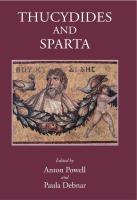
The Classical Press of Wales (2021) h/b 270pp £60.00 (ISBN 9781910589755)
Much of our contemporary literary evidence for Sparta during the pentekontaetia and Peloponnesian War derives from Thucydides’ History, whose air of detached rationalism can prove dangerously misleading. Not only might his vision have been blurred by le mirage spartiate, his own agenda led him to tailor (and sometimes even to distort) his material to portray the war as a clash of political and cultural opposites. It is to the credit of this brilliantly stimulating volume that the reader comes away from it armed, if not with all the answers, then certainly with many questions, whose consideration helps shed clearer light on Thucydides’ relationship with Sparta.
The scope of the eight essays is wide, ranging from the specific (Thomas J. Figueira’s closely argued consideration of ethnicity, focussing on the Messenian helots; Polly Law’s brief but insightful account of xenia and proxenia; and Ellen Millender’s thought-provoking examination of Thucydides’ views on Spartan kingship) to an intriguing discussion by Maria Fragoulaki of how and why Thucydides deliberately downplays the extent of Spartan colonization, Jean Ducat’s analysis of the presence of Sparta in Pericles’ Funeral Oration (an agon in which Athens and Sparta are compared, always to Athens’ advantage), Emily Greenwood’s excellent exploration of Thucydides’ general attitude to Sparta, and Debnar’s rebuttal of the notion of Spartan slowness—playing the long game is not sloth; given the right circumstances Spartans can act with surprising speed and spontaneity; and cautious King Archidamus’ reluctance to unleash war is based on good strategic sense.
Yet it is perhaps the final chapter that will remain in the reader’s consciousness for longest, the last contribution to this towering series to be written by Anton Powell before his death last year. In it, he questions how Thucydides came by much of his information about Sparta, and why he expresses such confidence in discussing events from a period that elsewhere he considers unknowable. Comparing Herodotus’ reporting of similar Spartan stories and ‘facts’ (for example regarding the machinations and deaths of Leotychidas and Pausanias) and questioning how Thucydides could know the details of such murky events as the massacre of 2,000 helots in c. 425 BC, he concludes that Spartans carefully fed both historians a version of the past designed specifically for foreign consumption to bolster Sparta and remove any whiff of vulnerability. The liberally educated aristocratic Thucydides had his own world view, but the Spartans had theirs, too, and, ‘those educated in open societies may be disarmed in the face of organised—rather than casual—disregard for truth’. While the true nature of Thucydides’ relationship with Sparta may never be known, the echo of a Spartan voice can occasionally be heard, whether in his description of the army assembled at Nemea prior to Agis’ disastrous attack on Argos—‘the most beautiful’ is typical Spartan visual language—or in the details of the subsequent Battle of Mantinea. A ‘useful idiot’ he most certainly was not, but the real Thucydides trap—a trap for Thucydides—may have been set and sprung by Sparta. As P. puts it so elegantly, ‘many of Sparta’s untruths may live on like extinct insects in the cloudy amber of Thucydides’ prose.’
With chapter endnotes and bibliographies, an index and map, this volume should be of value not just to students or scholars with a specific interest in Thucydides or Sparta, but to readers interested in how history works and how historians and their sources can shape our understanding of the world. Aware of the patterns formed by human endeavour, and branding his work a ‘possession for all time’, Thucydides would surely have agreed that fake news and alternative truths are nothing new.
David Stuttard
